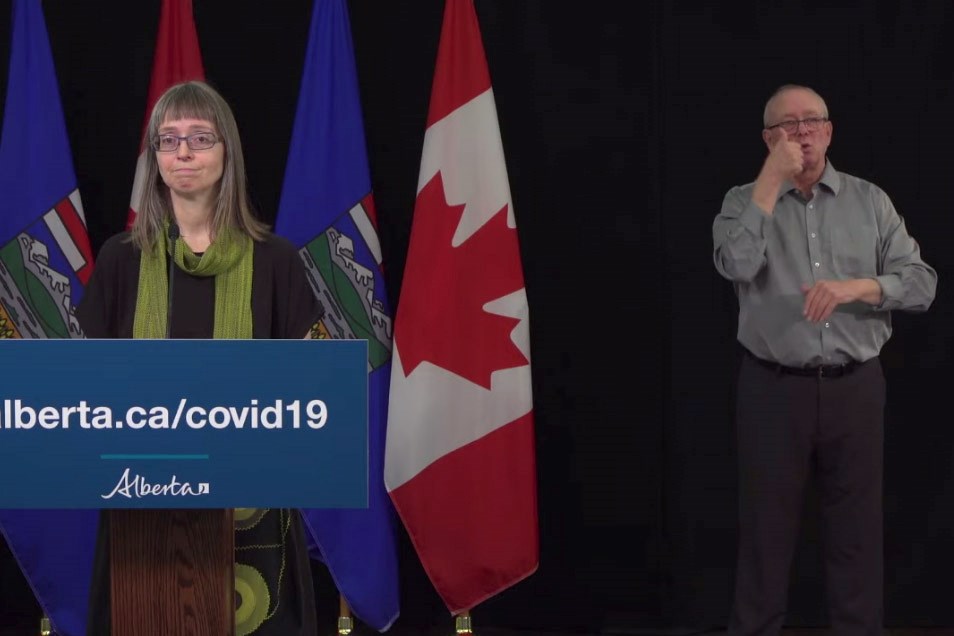Alberta Chief Medical Officer of Health Dr. Deena Hinshaw said the number of people with COVID-19 in the province rose by 162 since yesterday, bringing the total number of confirmed cases recorded in the province to 2,158.
Two people have died as a result of the virus since Wednesday's update. This includes a man in his 70s in the Calgary Zone, and a woman in her 80s in the North Zone. Both deaths happened within long-term care facilities, including at one centre in High River and at the Manoir du Lac facility in McLennan.
The Manoir du Lac facility has reported 38 cases of COVID-19 in staff and residents, and five deaths.
"The scale of this pandemic means we often talk in case numbers but we must never forget every case is a person. Every death is a tragedy for the people who love them," Hinshaw said.
Late Tuesday night, a power failure in the province's data centre caused a small electrical fire that affected Alberta’s monitoring of the spread of the disease. The feed has not yet been restored, but "teams are working around the clock to restore all applications as soon as possible," hopefully by tomorrow, Hinshaw said.
Testing was expanded to all Albertans showing symptoms of the virus. Since then, there was a significant spike in the number of referrals with between 5,000 or 6,000 a day, Hinshaw said. Roughly 2,779 tests were conducted over the last 24 hours.
"We anticipate the numbers will continue to go up throughout the week, and we will use those numbers to dig into the details."
Hinshaw said she wanted to remind Albertans that the virus is not airborne. Research suggesting droplets could spread farther than two metres also looked at the concentration of the virus in the air, she said, and how likely it is that the concentration of the virus from further away is high enough to present a risk.
"The bulk of it, the highest concentration, will be closest to the person. Staying that two metres away will still protect against the bulk of the exposure."
While there isn't a lot of evidence to suggest cloth masks are "ideal protection" against being exposed to others, it can be a helpful measure to prevent the spread from someone who may not be experiencing symptoms of the virus, she said.
New measures to protect workers
The Alberta and federal governments, with the input and assistance of industry and worker representatives, have developed a plan to respond to confirmed cases of COVID-19 in food processing plants.
Outbreaks have been recorded at several facilities in the province, including at a Kearl Lake oilsands workcamp and the Cargill meat plant in High River. Last week, seven staff members tested positive at the Foothills Medical Centre maternity ward in Calgary.
"No patients were affected, and no new staff cases have been reported in the past week," Hinshaw said.
"I want to assure Albertans there is no increased risk for pregnant patients coming to the Foothills Medical Centre. The maternity units continue to be a safe and appropriate place to deliver babies and receive care."
Hinshaw said Alberta Health Services continues to work closely with the companies to implement outbreak procedures and limit the spread.
- INTERACTIVE MAP: See the latest COVID-19 statistics across Canada by province/territory on our interactive map
When asked why the outbreak at the Foothills Medical Centre wasn't reported earlier, Hinshaw said patients were not put at risk with this specific outbreak, and the outbreaks reported are ones public health officials feel are in the public's interest.
Aggressive measures have been put in place to protect the health of staff and patients in every facility, including prohibiting non-essential visitors, and implementing strict infection prevention and control measures, Hinshaw said.
Starting today, April 16, workers in long-term care and designated supportive living sites will only be allowed to work at one location. This requirement must be fully implemented no later than April 23.
"We have not yet seen the peak of COVID-19 in Alberta. It is likely that we will continue to see occasional cases in every part of Alberta, including in some health care settings. When cases do arise, health officials take every possible step to isolate anyone who may be exposed, and ensure there is no broader risk to any patients."
Smoking, alcohol risks
Quitting smoking or vaping, even temporarily, can have positive outcomes in the prevention and treatment of COVID-19, Hinshaw said.
"Smoking increases the risk of poor outcomes from any lung infections, and this virus mainly affects the lungs," she said.
When people are smoking or vaping, they are also touching their mouth and lips, making it easier to catch the virus.
"I strongly recommend that anyone who smokes or vapes takes steps to quit or cut down during the pandemic. I know quitting is not easy, it takes incredible determination and support," Hinshaw said.
"In a time when it feels like we have little control over many things, this may help to focus on one thing that you can control. Please check with your pharmacist or your doctor to see if phone support is available to answer questions about your options to help support quitting or cutting down."
It's also important to limit alcohol consumption during the pandemic, Hinshaw said.
"Alcohol consumption can make many things worse, including health issues, risk-taking behaviours, mental health and violence. All Albertans should be mindful of how much they are drinking."
National recommendations suggest no more than two drinks a day for women, and no more than three drinks per day for men. While these are challenging days, it is more important than ever to look after both your physical and mental health, Hinshaw said.
"Remember the best thing anyone can do to protect ourselves from COVID-19 is practise physical distancing, wash our hands regularly, and follow all other public health measures that we have put in place. We will get through this together."



